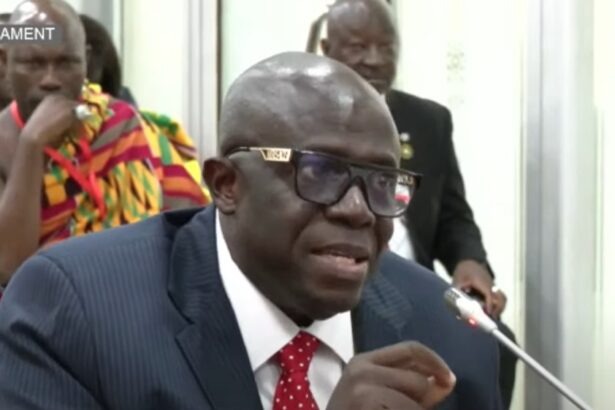Justice Sir Dennis Dominic Adjei, a Supreme Court nominee, presented a compelling vision for a more humane, transparent, and reform-driven judiciary during his vetting by the Appointments Committee of Parliament on Monday, 16th June, 2025.
His statements touched on a wide range of issues, including constitutional law, the death penalty, jury system reform, and the protection of human rights.
Justice Adjei, a respected jurist with years of experience on the bench, used the vetting platform to advocate for a judicial system that is not only technically sound but also morally grounded.
“We must first respect life,” he stated emphatically when addressing the issue of the mandatory death penalty. “I am against the mandatory imposition of the death sentence. The accused must not be subjected to inhuman treatment,” he said, affirming his belief that justice should be compassionate as well as firm.
Ghana’s Unique Legal Framework
Highlighting Ghana’s progressive legal structure, Justice Adjei proudly noted that Ghana was the first country to grant a supervisory role to the Supreme Court, setting a precedent in constitutional jurisprudence. He also emphasized the importance of upholding the rights enshrined in international agreements, noting that Ghana is a signatory to the African Charter on Human and Peoples’ Rights, and must live up to those obligations.
When asked about the independence of the judiciary, he was unequivocal in his stance: “Involving a judge in the role of the executive is wrong.”
Reforming the Jury System and Legal Practices
Justice Adjei also called for a careful re-assessment of Ghana’s jury system, stating: “We need to refine or reform the jury system in Ghana.” While he opposed the idea of jurors becoming professionalized, he stressed that the current model needed adjustments to enhance efficiency and justice delivery.
One of his boldest proposals was to abolish the practice of judges sitting as additional judges, citing the administrative and legal inconsistencies it can cause. “I will propose the abolishment of judges sitting as additional judges,” he said, suggesting it undermines judicial clarity and impartiality.
In another strongly worded opinion, he rejected the idea of including defilement cases under plea bargaining, arguing that it undermines the seriousness of such crimes. “If one cannot marry at 16, why should they have sex at that age?” he asked, underscoring his commitment to child protection and gender equality, both of which he has actively championed throughout his judicial career.
Human Rights, Law Enforcement, and Judicial Support
Justice Adjei took time to reflect on the broader scope of human rights, asserting that they cover issues ranging from children’s rights to gender equality. He passionately argued against corporal punishment, calling it “inhumane,” and expressed concern over the inadequate number of judges available to handle constitutional matters.
“We must have an adequate number to sit in the Supreme Court,” he emphasized, noting that for constitutional matters, a panel of 7, 9, or 11 justices may be needed to ensure balanced deliberation.
He also called for Parliament to preserve the budget for training judges, noting that judicial capacity building is essential to justice delivery. “We have enough laws in this country,” he said, “but the issue is enforcement. We must enforce our strong laws, especially those against illegal mining.”
Personal Background and Retirement Plans
Justice Adjei also spoke candidly about his personal background. He disclosed that he had been knighted by Pope Benedict, a recognition he holds with pride, despite having faced criticism over his association with a Catholic fraternity.
He informed the committee that if confirmed, he expects to retire in nine years, in line with the constitutional retirement age of 70 years for Supreme Court Justices. “Retiring at 70 is fine,” he noted, expressing confidence in the wisdom of that provision.
Conclusion
Justice Sir Dennis Dominic Adjei’s vetting session offered deep insights into the mind of a jurist deeply committed to justice, reform, and human dignity. His testimony before the Appointments Committee revealed a clear roadmap for how Ghana’s judiciary can continue to evolve, anchored in human rights, guided by constitutional integrity, and enriched by moral leadership.
As Parliament deliberates on his nomination, the nation watches with interest, hopeful that such principled voices will shape the future of justice in Ghana.













